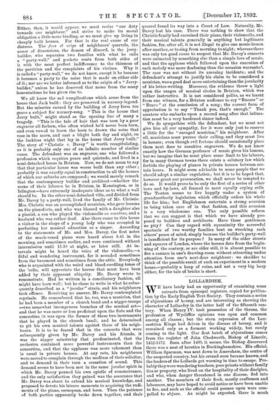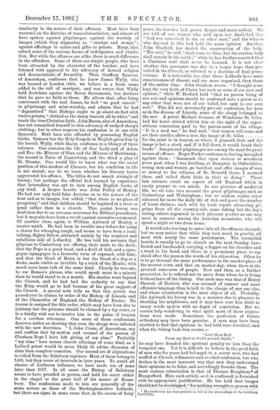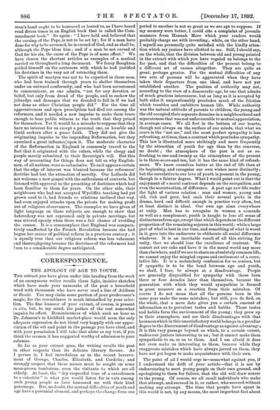LOLLARDISM,
WE have lately had an opportunity of examining some extracts from episcopal registers, copied for publica- tion by the Early English Text Society. They contain a series of abjurations of heresy, and are interesting as showing the character of Lollardry in the latter half of the fifteenth cen- tury. When Henry IV. took possession of the throne, the profession of Wycliffite opinions was open and common among all classes ; but the stern repression of the Lan- castrian Kings had driven in the disease of heresy, and it remained only as a ferment working widely, but rarely coming to the light. Our first batch of abjurations comes from the register of John Chedworth, Bishop of Lincolr, 1452.1471 Soon after 1460, it seems, the Bishop discovered there was a nest of heretics in Buckinghamshire. His official, William Sparman, was sent down to Amersham, the centre of the suspected country, but his errand soon became known, and the leaders of the Lollards got warning in time to escape. Pro- bably they were wandering teachers, poor priests without family ties or property, who lived on the hospitality of their disciples, and who, when danger threatened in one diocese, fled into another. The members of their flock, mostly craftsmen and labourers, may have hoped to avoid notice or have been unable to flee, and such as the official could pounce upon were com- pelled to abjure. As might be expected, there is much similarity in the nature of their offences. Most have been 'unsound on the doctrine of transubstantiation, and almost all have spoken against pilgrimages, against the worship of images (which they stigmatise as " stockys and stonys"), against offerings to saints and gifts to priests. Many, also, attack some of the various forms of indulgences and absolu- tion. Bat while the offences are alike, there is much difference in the offenders. Some of them are simple people, who have been attracted by the character of the teacher, and have listened with approval to his advocacy of inward religion and denunciations of formality. Thus Geoffrey Symeon, of Amersham, confesses that he knew James Wylly, who was burned at London (this, we believe is a fresh name added to the roll of martyrs), and was aware that Wylly held doctrines against the Seven Sacraments, but declares that he gave no faith to these. He allows that, after being 'conversant with the said James, he had " no good conceit " in pilgrimage and saint-worship, and admits that he had -" dogmatised" that Bishops ought to go about on foot with twelve priests, " clothed as the sheep beareth all in white," and teach the true Christian faith. John Baron, also of Amersham, has not committed himself to this advocacy of undyed sheep's clothing; but in other respects his confession is at one with Symeon's. Both have also offended by possessing English hooks. Symeon has the Holy Gospels in English given him by the heretic Wylly, while Baron confesses to a library of three volumes. One contains the life of Our Lady and of Adam and Eve, the Mirrour of Sins, and the Mirrour of Matrimony; the second is Tales of Canterbury, and the third a play of St. Dionise. One would like to know what was the social position of this student of Chaucer, but his condition in life is not stated ; nor do we learn whether his literary tastes aggravated his offence. The titles do not smack strongly of heresy; but perhaps the official had learned by experience that heterodoxy was apt to lurk among English books of any kind. A deeper heretic was John Polley of Henley. He bad not only held false doctrine as to the nature of the host and as to images, but added, " that there is no place of purgatory," and that children should be baptised in a river or pond rather than in a church. This quaint heresy was doubtless due to an extreme reverence for Biblical precedents, 'but it may also have been a revolt against excessive ceremonial. Of another class, again, is William Aylward of Henley, a master smith. He had been in trouble once before for using a charm for whooping cough, and seems to have been a loud- talking, flighty fellow, attracted mainly by the sceptical and rebellious side of Lollardry. He has told his servants that pilgrims to Canterbury are offering their souls to the devil; that the Pope is a great beast, and a devil of hell, and a syna- gogue (synagogue is a favourite term of reproach with him), and that the blood of Hales is but the blood of a dog or a drake, made visible or invisible by a trick of the Monks, with much more loose talk of the same kind. Clearly he was one, to use Romeo's phrase, who would speak more in a minute than he would stand to in a month. His chatter went beyond the Church, and he had had the audacity to say that the King would go to hell because of his great support of the Church. A special note tells us that this article was passed over in silence by order of the Bishop of Lincoln and of the Chancellor of England, the Bishop of Exeter. No reason is assigned for this order, which may have been due to jealousy lest the prisoner should be claimed by a lay court, or to a kindly wish not to involve him in the pains of treason for a careless utterance. One more of these confessions deserves notice as showing that even the clergy were infected with the new doctrines. " I, John Crane, of Amersham, say and confess that by motion and counsel of the parson of Chesham Boys I have left giving of my alma." Probably "my alms" here means church offerings of some kind, as a Lollard priest would be more likely to advise diversion of alms than complete cessation. Our second set of abjurations is called from the Salisbury registers. Most of them belong to 1.499, but they occur at intervals in later years. To avoid all chance of Lutheran influence, we have made use of none later than 1517. In all cases the Bishop of Salisbury seems to have presided in person, and held his court either in the chapel or the great hall of his manor of Rams- bury. The confessions made to him are generally of the same nature as those of the Buckinghamshire Lollards, bat there are signs in some cases that, in the course of forty
years, the heresiEs bad grown deeper and more radical. We are told of one woman who said upon her death-bed that " God was conceived in sin, as other men," and the witness who deposed to this had held the same opinion. Another, John Olseford, has denied the resurrection of the body. "The soul," he said, "shall come to bliss, but the carrion body shall remain in the earth ;" while he has further asserted that a Christian soul shall never be damned. It is not clear whether this assurance was due to a larger hope than pre- vailed in the Church, or referred to a doctrine of final perse- verance. It is noticeable, too, that these Lollards have more consciousness of dissent, and are more organised, than those of the earlier time. John Goodson avows : " I thought none kept the very faith of Christ but such as were of our sect and opinion ;" while W. Berford held "that no person being of our sect and opinions should be confessed unto a priest or to any other that were not of our belief, but only to our own sect." This did not necessarily prevent confession, for here as in the diocese of Lincoln, some of the clergy belonged to the sect. A priest, Michael Gamare, of Wimborne St. Giles, had his heart stirred within him at the sight of the super- stitious veneration paid to the patron-saint of his village. " It is a mad use," he had said, " that women will come and
set their candles afore a tree, the image of St. Giles for the saint is in heaven, or where it pleaseth God, and the image is but a stock, and if it fell down, it would break their heads." Images and pilgrimages are among the most frequent causes of offence. Roger Parker confesses to having inveighed against them : " Insomuch that upon sixteen or seventeen years past, when I was dwelling at Bampton, in Oxfordshire, seeing men and women go barefoot and offer images of wax or money to the reliques of St. Bernold there, I scorned them, and called them fools in their so doing." These last extracts recall an aspect of old England which is rarely present to our minds. In our pictures of medieval life, we all take into account the great pilgrimages such as Canterbury and Walsingham ; but we seldom realise (what coloured far more the daily life of rich and poor) the number of lesser shrines ; each with its local repute attracting pil- grims from all the country-side, some taking but the day's outing, others organised in such pleasant parties as one may meet in summer among the Austrian mountains, who will spend a night or two from home.
It would take too long to enter into all the offences charged ; but we may notice that while they vary much in gravity, all meet with nearly the same punishment. The reconciled heretic is usually to go to church on the next Sunday, bare- footed and bareheaded, carrying a faggot on his shoulder and a torch in his hand, and there in a prominent place to say aloud after the parson the words of his abjuration. Often be is to go through the same performance in the market-place of the nearest town, and that on market-day, when there is the greatest concourse of people. Now and then, as a further precaution, he is ordered not to move from where he is living without leave of the bishop. One such case was that of Henry Shercot, of Devizes, who was accused of coarser and more offensive language than is laid to the charge of any one else, and whose recantation is the most abject of all. Probably, like Aylward, his heresy was in a measure due to pleasure in shocking his neighbours, and it may have cost him little to unsay words spoken with no depth of conviction. But we cannot help wondering in what spirit most of these abjura- tions were made. Sometimes the profession of future orthodoxy may have been genuine. A man may have been startled to find that opinions he had held were heretical, and when the bishop bade him recant,—
"Lest thou fleet From my first to God's second death;' he may have dreaded the spiritual penalty no less than the temporal one. Yet it is difficult to believe in the good faith of men who for years had belonged to a secret sect, who had scoffed at Church ordinances and avoided confession, but who declare in the most innocent way that now they understand their opinions to be false, and accordingly forsake them. The most curious retractation is that of Thomas Boughton,* of Hungerford. Here each article, as it is confessed, is furnished with its appropriate justification. He has held that images should not be worshipped, " for nothing wrought or graven with
His confession has been printed in full in the proceedings of the Falisbury Field Club.
man's hand ought to be honoured or louted to, as I have heard read divers times in an English book that is called the Com- mandment book." So again : " I have held and believed that the cursing of the Pope is not to be set by ; for if a man have done for why to be accursed, he is cursed of God, and so shall be, although the Pope bless him ; and if a man be not cursed of God for his sin, the curse of the Pope is of none effect." We have chosen the shortest articles as examples of a method carried on throughout a long document. We fancy Boughton prided himself on the acuteness with which he had justified his doctrines in the very act of retracting them.
The spirit of martyrs was not to be expected in these men, who had been trained through years to shelter themselves under an outward conformity, and who had been accustomed to communicate, as one admits, " not for any devotion or belief, but only from dread of the people, and to eschew the jubardye and damages that we dreaded to fall in if we had not done as other Christian people did." For the time all aggressiveness and open proselytism had died out among the reformers, and it needed a new impulse to make them brave enough to bear public witness to the truth that they prized for themselves. Yet it would be a mistake to suppose that they have no interest for us except a personal one, as humble and timid seekers after a purer faith. They did not give the originating impulse to the impending Reformation, but they exercised a great influence:upon it. The moderate character of the Reformation in England is commonly traced to the fact that it originated with the rulers, while the clergy and people merely submitted to their Sovereign's will. But this way of accounting for things does not tell us why English- men, of all nations, were so submissive. To us it appears certain that the edge of interest was blunted because the reformers' doctrine had lost the attraction of novelty. Our Lollards did not welcome a new gospel with the enthusiasm of converts, but listened with approval to the preaching of doctrines which had been familiar to them for years. On the other side, their neighbours who had not accepted Wycliffite teaching had yet grown used to it, bad friends or relations inclined that way, had even enjoyed attacks upon the priests for making profit out of religious observances. The examples we have given of light language on these subjects are enough to show that heterodoxy was not expressed only in private meetings, but was uttered openly when there was a fair chance of avoiding the censor. It is a commonplace that England was compara- tively unaffected by the French Revolution because she had begun her career of political reform in a previous century ; it is equally true that our religious reform was less vehement and thoroughgoing because the doctrines of the reformers had been to a considerable degree anticipated.








































 Previous page
Previous page